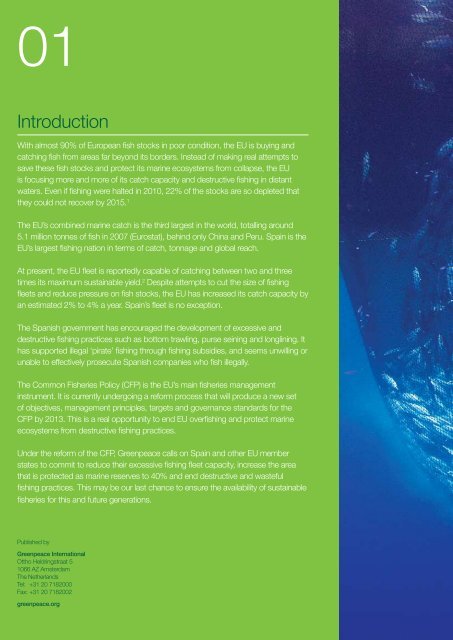The destructive practices of Spain's fishing armada - Greenpeace
The destructive practices of Spain's fishing armada - Greenpeace
The destructive practices of Spain's fishing armada - Greenpeace
You also want an ePaper? Increase the reach of your titles
YUMPU automatically turns print PDFs into web optimized ePapers that Google loves.
01<br />
Introduction<br />
With almost 90% <strong>of</strong> European fish stocks in poor condition, the EU is buying and<br />
catching fish from areas far beyond its borders. Instead <strong>of</strong> making real attempts to<br />
save these fish stocks and protect its marine ecosystems from collapse, the EU<br />
is focusing more and more <strong>of</strong> its catch capacity and <strong>destructive</strong> <strong>fishing</strong> in distant<br />
waters. Even if <strong>fishing</strong> were halted in 2010, 22% <strong>of</strong> the stocks are so depleted that<br />
they could not recover by 2015. 1<br />
<strong>The</strong> EU’s combined marine catch is the third largest in the world, totalling around<br />
5.1 million tonnes <strong>of</strong> fish in 2007 (Eurostat), behind only China and Peru. Spain is the<br />
EU’s largest <strong>fishing</strong> nation in terms <strong>of</strong> catch, tonnage and global reach.<br />
At present, the EU fleet is reportedly capable <strong>of</strong> catching between two and three<br />
times its maximum sustainable yield. 2 Despite attempts to cut the size <strong>of</strong> <strong>fishing</strong><br />
fleets and reduce pressure on fish stocks, the EU has increased its catch capacity by<br />
an estimated 2% to 4% a year. Spain’s fleet is no exception.<br />
<strong>The</strong> Spanish government has encouraged the development <strong>of</strong> excessive and<br />
<strong>destructive</strong> <strong>fishing</strong> <strong>practices</strong> such as bottom trawling, purse seining and longlining. It<br />
has supported illegal ‘pirate’ <strong>fishing</strong> through <strong>fishing</strong> subsidies, and seems unwilling or<br />
unable to effectively prosecute Spanish companies who fish illegally.<br />
<strong>The</strong> Common Fisheries Policy (CFP) is the EU’s main fisheries management<br />
instrument. It is currently undergoing a reform process that will produce a new set<br />
<strong>of</strong> objectives, management principles, targets and governance standards for the<br />
CFP by 2013. This is a real opportunity to end EU over<strong>fishing</strong> and protect marine<br />
ecosystems from <strong>destructive</strong> <strong>fishing</strong> <strong>practices</strong>.<br />
Under the reform <strong>of</strong> the CFP, <strong>Greenpeace</strong> calls on Spain and other EU member<br />
states to commit to reduce their excessive <strong>fishing</strong> fleet capacity, increase the area<br />
that is protected as marine reserves to 40% and end <strong>destructive</strong> and wasteful<br />
<strong>fishing</strong> <strong>practices</strong>. This may be our last chance to ensure the availability <strong>of</strong> sustainable<br />
fisheries for this and future generations.<br />
Published by<br />
<strong>Greenpeace</strong> International<br />
Ottho Heldringstraat 5<br />
1066 AZ Amsterdam<br />
<strong>The</strong> Netherlands<br />
Tel: +31 20 7182000<br />
Fax: +31 20 7182002<br />
greenpeace.org<br />
2 Spain and the Common Fisheries Policy

















